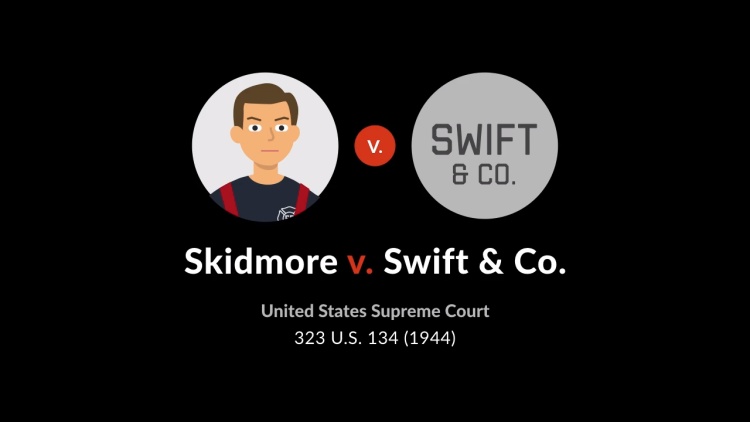Skidmore v. Swift & Co.
United States Supreme Court
323 U.S. 134 (1944)
- Written by Lauren Petersen, JD
Facts
Skidmore and six others (plaintiffs) (the employees) were employed as firefighters at a packing plant run by Swift & Co. (Swift) (defendant). The employees worked daytime shifts, five days per week. As part of their employment, the employees were also required to stay overnight in the fire hall on the plant’s premises three and one-half to four nights per week. The employees’ overnight duties were to respond to fire alarms. The employees were paid for any time they spent responding to alarms during their overnight stays, but they were not paid for any of their other overnight time. The employees sued Swift under the Fair Labor Standards Act (the act), 29 U.S.C.A. § 201, seeking overtime compensation for the hours they spent overnight at the plant. The trial court referred to an interpretive bulletin issued by the administrator of the United States Department of Labor’s Wage and Hour Division, which included standards and guidance regarding how to interpret the act in various circumstances. The administrator’s guidance suggested applying the act flexibly, based on the degree to which an employee could conduct personal activities during on-call time and the number of consecutive hours the employee was on call without being required to actively work. Nevertheless, the trial court concluded that as a matter of law, the time the employees spent overnight on call in Swift’s fire hall did not count as hours worked for purposes of overtime compensation. The court of appeals affirmed, and the United States Supreme Court granted certiorari.
Rule of Law
Issue
Holding and Reasoning (Jackson, J.)
What to do next…
Here's why 907,000 law students have relied on our case briefs:
- Written by law professors and practitioners, not other law students. 47,100 briefs, keyed to 996 casebooks. Top-notch customer support.
- The right amount of information, includes the facts, issues, rule of law, holding and reasoning, and any concurrences and dissents.
- Access in your classes, works on your mobile and tablet. Massive library of related video lessons and high quality multiple-choice questions.
- Easy to use, uniform format for every case brief. Written in plain English, not in legalese. Our briefs summarize and simplify; they don’t just repeat the court’s language.





